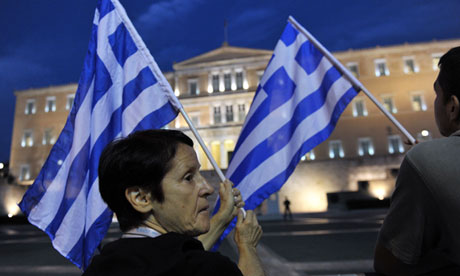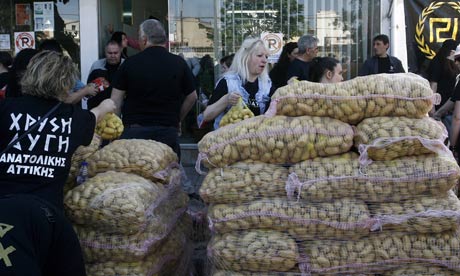Three years after Greek bailout, Russian, Chinese and Qatari investors jostle for access into new trade gateway to Europe
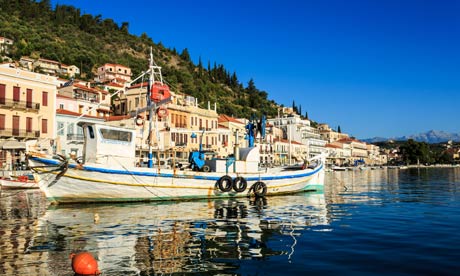
Gytheio harbour, Greece. The country can become a gateway for investment and trade flows between China and Europe, says its prime minister. Photograph: Alamy
The Chinese are interested in airports, harbours and railways. The Russians are determined to infiltrate the energy market. The Qataris have made clear they want to invest in property.
Three years to the month after becoming the first eurozone country to be bailed out by the European Union (EU), European Central Bank (ECB) and International Monetary Fund (IMF), Greece has finally got its long-delayed privatisation campaign off the ground, and the programme has turned the debt-choked country into a battleground for nations seeking access to the EU trading bloc.
"We have to transmit the message that this is a different Greece," the development minister, Kostis Hadzidakis, said in an interview. "We have to surprise in a positive way. Privatisations will send the message that we are a business-friendly country."
The prime minister, Antonis Samaras, took that message to Beijing this month, urging China to participate in what he described as Athens' success story. He was buoyed by a raft of unusually good news: international creditors had agreed to prop up the economy with another €8.8bn (£7.5bn) in rescue funds, Fitch had upgraded Greece's credit rating, while borrowing costs on 10-year bonds in May fell to their lowest level since the outbreak of the debt crisis.
If ever there was a time, it was now, for the Asian tiger to pursue its desire to make Greece a gateway to Europe by investing in infrastructure projects beyond Piraeus port. As Europe's biggest passenger harbour and one of its top 10 container terminals, the docks at Piraeus have become an operational base for the Chinese since Cosco, its state-run shipping company, paid €500m to lease half of them in 2010.
"Greece can become a real gateway for investment and trade flows between China and Europe, " said Samaras, whose conservative-dominated coalition has been credited with bringing political stability to the crisis-hit country since it assumed office last June. During his visit, 11 bilateral agreements were signed with Chinese officials, who have also signalled their interest in taking over Athens' international airport.
Last week, it was Moscow's turn, with Alexey Miller, the powerful head of Gazprom, Russia's biggest gas producer, flying into Athens for the third time in as many months to discuss buying Depa, Greece's natural gas corporation. Gazprom, which supplies 90% of Greece's natural gas through a pipeline from Bulgaria, made a preliminary €900m bid for Depa last year, although insiders say the deal will probably be closed for €750m.
As the country's sole retail gas distributor, Depa is one of two companies viewed as the jewel in the crown of a privatisation programme that, though wildly off target, is among the most ambitious undertaken on the continent of Europe. The other is the state gambling monopoly Opap, a third of which was sold to Greek-Czech investors this month.
In private talks with Samaras, Miller made clear that Moscow not only wanted to take over the corporation, but would brook no interference in the deal. The US and EU have raised objections to Russia exerting further influence over the energy sector in what has become an increasingly delicate geopolitical balancing act for Greece.
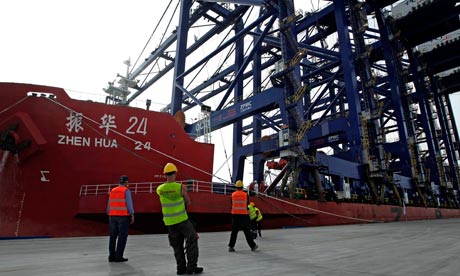 Cosco terminal at the port of Piraeus. The docks have become an operational base for the Chinese. Photograph: Alkis Konstantinidis/EPA
Cosco terminal at the port of Piraeus. The docks have become an operational base for the Chinese. Photograph: Alkis Konstantinidis/EPA
Over the weekend, Greek officials said plans were afoot to sell Desfa, the natural gas network's operator, to Azerbaijan's state oil company, Socar, which is believed to be backed by US interests "for the sake of equilibrium".
A deadline for bids for Depa, originally set for 29 May, has been scheduled for early June.
In his office overlooking Syntagma square, Hadzidakis claims that what Greece has experienced is more than just an economic crisis. "It is an historic moment, a turning point for our country, the fight of our generation that we are condemned to win," he said. "If we are successful in selling both Opap and Depa, then we win a central battle and the privatisations to follow will be easier," adding that the government would work on the principle of selling to the highest bidder. "The whole process is fully transparent."
In its sixth consecutive year of recession, Greece, the recipient of €240bn in rescue funds, the biggest bailout in western history, is under immense pressure to push ahead with privatisations to cut a debt load that is projected to reach 185% of GDP this year. Samaras's tripartite coalition has similarly announced plans for the gradual denationalisation of the country's biggest electricity generator, DEH.
The breakneck speed at which the privatisations are taking place – regional airports, industrial real estate, sporting facilities, beaches, state-run hotels and even thermal baths were recently handed over to the state privatisation fund, Taiped – follows earlier criticism from the EU that the sell-offs have been painfully slow.
The programme, initially aimed at raising €50bn by 2019, has been repeatedly scaled back, with the government now intending to raise €11.1bn by 2016 and €25bn by 2020. A goal of €2.6bn has been set for 2013.
"Privatisations are never going to solve this country's financial problems," said Prof Theodore Pelagidis, head of economic analysis at Piraeus University. "But it is hoped they will eliminate state-linked corruption and increase production efficiency."
Hadzidakis said the privatisations would be the best proof yet that Athens is not only determined to revitalise investor confidence, but committed to pushing ahead with unpopular reforms.
Highly sensitive, the sale of prized state assets, or "the family silver", has long been perceived as the ultimate humiliation for a nation hobbled, more than any other on the periphery of Europe, by the punishing effects of relentless austerity.
"Even those who were against privatisations can accept them now," said the politician who had first-hand experience of public resistance to the sell-offs when he oversaw the sale of the nation's official carrier, Olympic Airways, in 2009. "They understand that privatising state-owned organisations is a prerequisite to tackling the problem of unemployment," he added, referring to Greece's record jobless rate of 27%. "People can see that the public sector is unable to create new jobs."
 Gazprom chief Alexey Miller, left, leaves the Maximos mansion after a meeting with the Greek prime minister, Antonis Samaras. Photograph: EPA/Alexandros Vlachos
Gazprom chief Alexey Miller, left, leaves the Maximos mansion after a meeting with the Greek prime minister, Antonis Samaras. Photograph: EPA/Alexandros Vlachos
To this end, he added, it was vital that potential investors were given the "red-carpet treatment" rather than the "red-tape nightmare" widely blamed for the country's notorious lack of competitiveness.
"Our objective," said Hadzidakis, "is to make Greece a transit hub in the broader region, which is why we are also working with the World Bank to see how we can develop a logistics sector as well."
Such is the desire to lure investors that the Greek parliament recently passed legislation offering five-year residence permits to non-EU citizens purchasing property worth more than €250,000.
The move was widely seen as a sop to the Chinese, who are keen to be able to travel freely in the 27-nation EU bloc. Although the Qataris have also expressed interest in developing Athens' former airport at Hellenikon, pouring €100bn into a joint investment fund, few, if any, EU member states have exhibited any desire to invest in Greece.
For all the official euphoria, the sell-offs have been the focus of widespread criticism, with opponents pointing out that at a time of depressed market rates, Opap, once the nation's most profitable state enterprise, received only two bids for the 33% stake in the company.
The winning bidder, the Emma Delta fund, will pay €652m for the stake plus management rights in the company, nearly €100m less than its market value based on the company's share price on the day the offer was submitted. However, Athens' total receipts from the sale will rise to €712m after dividends under the terms of the deal.
The reduced price tags have prompted political opponents to pledge to take to the streets once again and also to describe the programme as more of a "sell-out" than "sell-off".
"They are trying to convince us that the climate is changing because they are forging ahead with the programme of pillaging national wealth, which they call the privatisation programme," said Alexis Tsipras, head of the main opposition party, the radical-left Syriza. "What they don't say is that the sales, the change of ownership of profit-making organisations, are not about [to bring] investment. They won't bring growth or jobs."
What is up for grabs
Athens' old international Airport Hellenikon, which at almost 70m sq ft, is three times the size of Monaco. It is also Europe's biggest development project
Natural gas corporation Public power corporation
Ports of Piraeus and Thessaloniki
Regional airports
Island marinas
Rail network
Water companies in Athens and Thessaloniki
Formerly exclusive state-owned Xenia hotel chain
Real estate for tourism development
Beach plots
Thermal baths


![The [Greek] European Tragedy](http://3.bp.blogspot.com/-OSMAuv1xvEY/UUpsO5__BaI/AAAAAAAABsg/DZGqo9w12Ek/s920/GkBack_new.jpg)



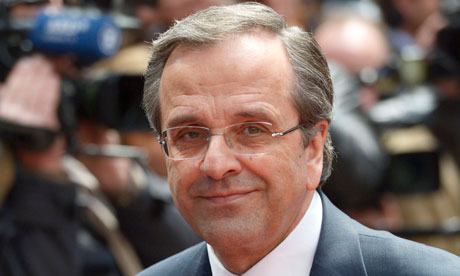


 Cosco terminal at the port of Piraeus. The docks have become an operational base for the Chinese. Photograph: Alkis Konstantinidis/EPA
Cosco terminal at the port of Piraeus. The docks have become an operational base for the Chinese. Photograph: Alkis Konstantinidis/EPA  Gazprom chief Alexey Miller, left, leaves the Maximos mansion after a meeting with the Greek prime minister, Antonis Samaras. Photograph: EPA/Alexandros Vlachos
Gazprom chief Alexey Miller, left, leaves the Maximos mansion after a meeting with the Greek prime minister, Antonis Samaras. Photograph: EPA/Alexandros Vlachos 


